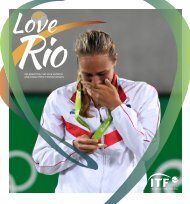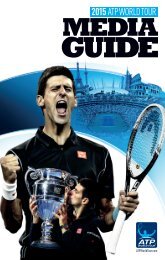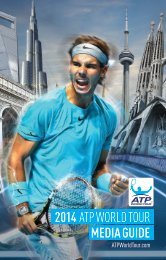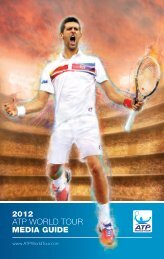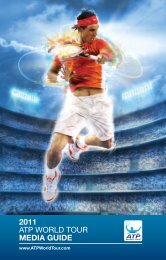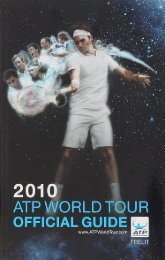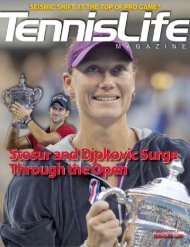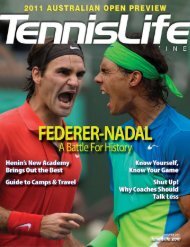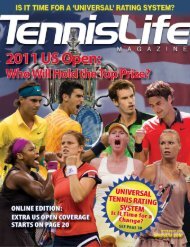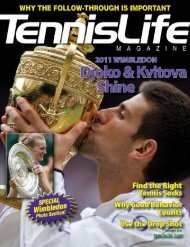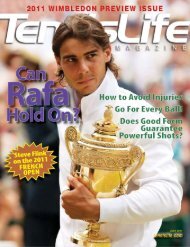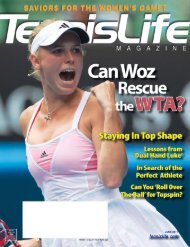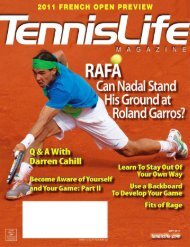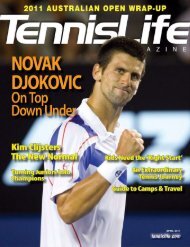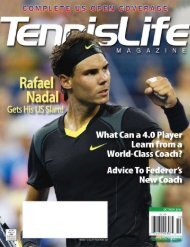A Champion's Mind - Pete Sampras
www.tennismoscow.me Insta:TENNISMOSCOW
www.tennismoscow.me Insta:TENNISMOSCOW
Create successful ePaper yourself
Turn your PDF publications into a flip-book with our unique Google optimized e-Paper software.
was something on my mind, I would just bring it up over dinner, or after a practice session. Just throw it<br />
out there to see what Paul had to say. I would sometimes ask what Paul thought an opponent was going to<br />
try to do against me, and found he was very good at those predictions.<br />
Tim Gullikson always wanted me to hold my head high and show no weakness to opponents, but Paul<br />
took it one step further and liked for me to be slightly arrogant—you know, take that attitude, I’m <strong>Pete</strong><br />
<strong>Sampras</strong> and you’re not. He felt I was too self-effacing, too nice. He would say, “These guys are afraid<br />
of you, and you need to know that and exploit it.” He was right. I never went out there afraid of anybody,<br />
but I didn’t always take full advantage of my reputation and presence, either.<br />
I could go either way on that issue. It wasn’t like me to be more assertive, and I was uncomfortable<br />
consciously trying to cultivate the image that I was. I didn’t want to misrepresent myself, and I never<br />
wanted to be perceived as cocky. I also felt there was a definite value in being so low-key that it made my<br />
opponents nervous, made them just look and wonder what I might be thinking. The way a Boris Becker<br />
strode around the court with this natural air of entitlement probably motivated guys to try to beat him. I<br />
didn’t want to intimidate guys; it was just as valuable, in my mind, to make them nervous.<br />
Besides, if I didn’t act like I owned the world, it was more likely that I wouldn’t feel that I did. It was<br />
important for me to do that, because by the time Paul was my full-time coach, one of the big dangers for<br />
me was letting my own press clippings go to my head. I took special care to play every tournament, week<br />
after week, as if it really mattered. I always went out there taking nothing for granted, feeling like I had to<br />
prove myself. I actually enjoyed that, maybe because it ended up giving me some extra positive<br />
reinforcement when I did win. I never felt blasé after beating someone.<br />
There were periods, of course, when I became a little tired or bored with the typical pro’s routine, and<br />
I wanted Paul to be hard on me if he thought I was slacking off. A few times I hit a plateau, careerwise,<br />
and started taking shortcuts. It just happens; you need to go on autopilot once in a while. Paul recognized<br />
when that was the case, and called me on it. He knew my mind, even though a champion’s mind isn’t<br />
always that easy to know.<br />
Like I’ve said, Paul never got the credit he deserved. But in the end, I know what he did for me. I won<br />
ten of my fourteen Grand Slams with him, and he guided me with a firm hand through some of the most<br />
heartbreaking, challenging moments of my career.<br />
As much of a blow as it was to lose in Paris, there was always Wimbledon. When Paul and I arrived in<br />
England a few days after losing in the French, I appreciated the cool climate and those beautiful grass<br />
courts. It was like deleting every recent file on my mental hard drive and starting over. I really needed to<br />
regroup after the shocking collapse in Paris. The year was halfway over and, like most years, I would<br />
judge it a success or failure depending on whether or not I won a major.<br />
I skipped all the warm-up tournaments for Wimbledon in 1996, hoping to regain my stores of stamina<br />
and energy. Things started to click for me when the tournament began, and although I lost a set to my<br />
Davis Cup buddy Richey Reneberg in the first round, pretty soon I was firing on all cylinders. I hammered<br />
Mark Philippoussis in straight sets in the round of 16. I rolled through Cédric Pioline, losing just ten<br />
games. In the quarterfinals, I would be playing Richard Krajicek, the rangy, tall, hard-serving Dutchman<br />
who was always a threat on fast surfaces. He could pop up at any time and win a tournament, looking like<br />
the second coming of Pancho Gonzalez. At other times, he was just another big guy with a good serve who<br />
didn’t seem to have the confidence or drive to win, week in, week out.<br />
I felt that Richard was a little nervous as we warmed up under leaden skies. But he held his own<br />
through the first seven or eight games, each of us taking care of his serve. Everything was fine, in my<br />
book. I was making him work on his service games, and I was getting pretty good looks at his second<br />
serves. I had break points here and there, which was encouraging even when I didn’t convert them. I had



